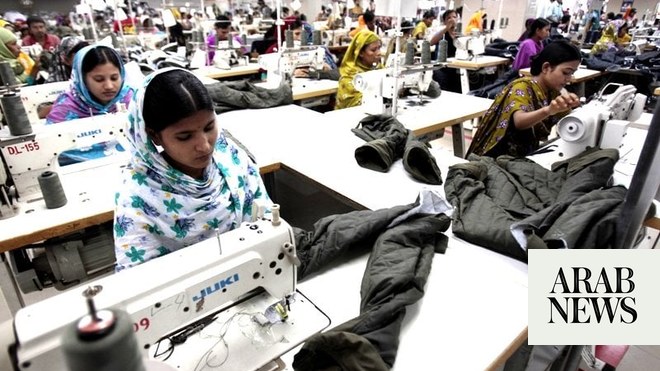
The future of a landmark deal to improve safety at clothing factories in Bangladesh is in doubt, unions have said, in the run-up to the eighth anniversary of the collapse of the Rana Plaza building in which more than 1,100 garment workers died.
More than 200 brands, including Primark, Marks & Spencer and H&M, signed up to the Bangladesh accord on fire and building safety after the 2013 disaster at the factory in the outskirts of Dhaka. That deal, agreed with the international clothing workers’ unions UNI Global and IndustriALL, is due to expire next month.
It will be superseded by the Bangladesh-government backed Ready-Made Garment Sustainability Council (RSC), which brands and factory owners have already signed up to.
However, unions are concerned because the RSC deal does not include legally binding commitments under which individual brands must ensure the factories they use are up to scratch, helping to fund any improvements required to make them safe.
The accord established an independent body to inspect and survey factories supplying signatory brands. Factories had to comply, with the brands’ help, or they would lose their business.
It led to nearly 200 factories being disqualified for poor safety standards after more than 38,000 inspections at facilities covering two million workers. More than 120,000 fire, building and electrical hazards were fixed.
The UNI Global Union says unless unions can agree extension of the accord’s legally binding terms they will have no way to push through the potentially life-saving but difficult and expensive changes that are still required at factories.
“We don’t have the same means to hold brands accountable. The key element of the last agreement was that it legally binds them. They have responsibility for all factories producing [garments] for them in Bangladesh either directly or via middlemen,” said Alke Boessiger, the deputy general secretary of the unions.
She said unions also wanted to see a continuation of health and safety training for workers and their managers and an anonymous whistleblowing system, which had helped identify and deal with new problems in factories as they emerged.
Unions also want to extend the deal to other garment-producing countries.
But Boessiger said brands had become more reluctant to sign up and wanted to go back to old fashioned self-monitoring after a tough year for fashion retail which has been hard hit by the Covid-19 pandemic.
Efforts to control the virus around the world have led to the temporary or permanent closure of many clothing shops while a shift to working from home and limits on socialising and special events have put a dampener on spending on fashion.
“There is no doubt that businesses have taken a big hit and that’s had a direct effect on the production side. That cannot mean that health & safety in factories is no longer of importance,” Boessiger said.
“There is absolutely no doubt that factories are in a different state than they were in 2013 but we still have thousands of factories that have not completed remediation.”
Brands involved in the discussions with unions said they were ongoing, led by five major retailers including the Swedish fashion chain H&M, Zara’s owner, Inditex, and Denmark’s Bestseller.
A joint statement from the original accord signatories said they were “committed to secure fire, building and electrical safety in the long term at all our producing factories in Bangladesh”.
H&M added: “Since the accord was initiated in 2013, the industry has gone through a remarkable change with regards to workers’ safety. Working on the ground in Bangladesh, this has been evident to us.”
The company said it was focused on securing “independence, resources and financing” for the RSC to secure workplace safety and sustainable change for the industry in Bangladesh and was “actively taking part” in negotiations on how to proceed.
Primark, which paid out millions of pounds in compensation to victims at Rana Plaza where one of its suppliers was based, said it was “committed to ensuring continued safety and good working conditions in Bangladesh”.
It added: “Primark established its own Structural Integrity Programme in 2013, an innovative programme which seeks to improve worker safety by ensuring building integrity though factory inspection and remediation. Developed by structural engineers, the programme covers all factories in Bangladesh manufacturing products for Primark.”












